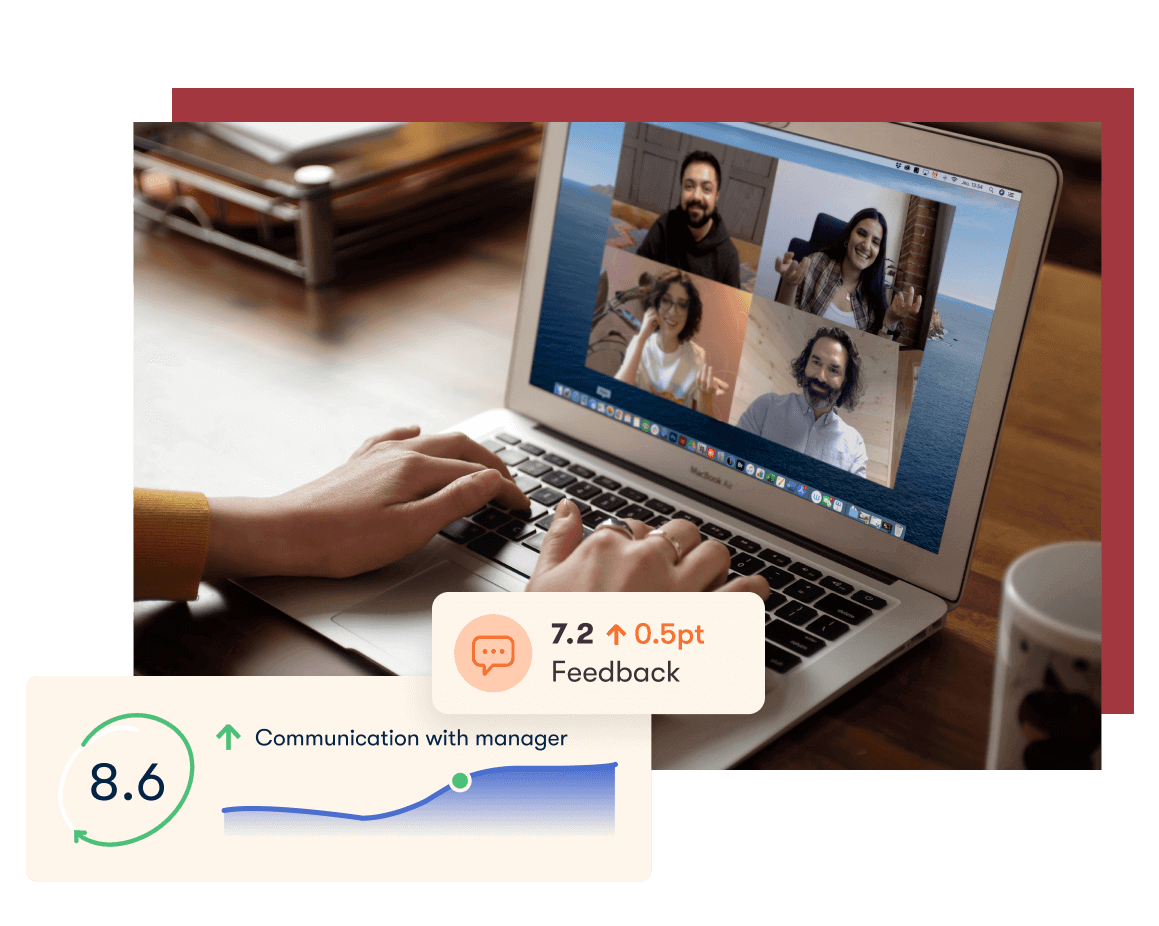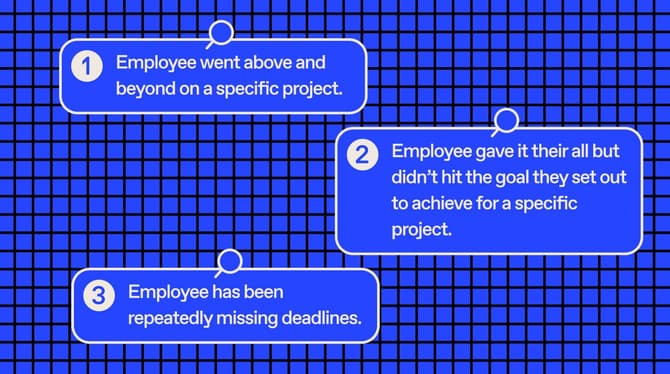In an ideal world, every company would have a thriving workforce with every employee firing on all cylinders at all times. But that simply isn't the reality. People are human, they have ups and downs, they have periods where they feel more engaged and perform better and others where they show signs of disengagement and lack motivation.
Trying to improve their engagement without a strategy in place is like trying to drive somewhere new without a map. You need a starting point, a destination you'd like to reach, and the guidance to help you navigate your way there.
As a manager, conducting employee engagement surveys can be a great way to start collecting insights and track metrics so you can reach your engagement goals. The right survey questions can help managers understand their team, boost employee engagement, motivate the team toward higher productivity, and even help ensure a healthy work-life balance.
In this article, we’ve broken down our employee engagement survey questions (and reasoning) into 10 clear categories. We also explain why to use employee survey questions, how to create them, and tips for administering them. By running these kinds of employee surveys weekly, management will be better able to stay up to speed with their employee morale and performance, and ultimately amplify team engagement.
Exclusive online summit
·
May 23 2024
Moments that matter: how to seed great work
What's in this article
- Why use employee survey questions?
- How to create effective employee survey questions
- Survey questions to assess employee engagement
- Survey questions to garner employee feedback
- Survey questions to improve employee satisfaction
- Survey questions to understand and improve company culture
- Survey questions for distributed teams
- Survey questions for employee recognition and morale
- Survey questions for career growth and personal growth
- Survey questions about relationships with managers
- Survey questions to understand how employees perceive their workplace relationships
- Tips for administering employee surveys
- Create engaged employees
Why use employee survey questions?
There are a number of great reasons to use employee survey questions. They provide you with valuable insights that you can then act on to help elevate and motivate the whole team. So let's dive right into the why.
The benefits of employee surveys
Better insights and progress tracking:
- Employee surveys provide valuable insights into employee opinions and feelings that you can consider moving forward.
- They allow you to identify the strengths and weaknesses within the organization so you can better leverage the strengths and find solutions to the weaknesses.
- They help measure employee engagement to better track progress and growth over time. By gathering feedback, taking action, then following up with subsequent surveys, you can really see the impact your changes are having.
Improved employee engagement and satisfaction:
- Surveys can help you identify areas where employees are not satisfied. When you know why they are unhappy about something you're able to find ways to make positive shifts.
- They provide opportunities to address concerns and improve employee morale. Knowing each person's specific challenges and aspirations can open the doors to constructive conversations.
- They increase employee motivation and loyalty by letting them know that you are in tune with them, hearing them, and supporting them.
Increased productivity:
- They help identify factors that may be hindering productivity so that managers can then address what's causing them to lose focus and help get them back on track.
- They help you tap into ways to increase productivity for each employee on your team.
- They encourage collaboration between team members and support more open communication.
Better decision making:
- They provide you with valuable insights that support a more informed decision-making process.
- They provide plenty of useful data to support management decisions.
- With the data in hand, and the ability to make more informed decisions, it also increases the likelihood of successful outcomes.
Reduced employee turnover:
- Employee engagement surveys help identify the causes of employee turnover. Knowing the underlying issues allows you to understand what’s impacting your employee turnover rate.
- Having this information helps you develop solid solutions to reduce employee turnover.
- These insights can also help increase employee retention and loyalty. Win win!
Employee surveys are a great tool to help you perform as a great leader within your company. Here are another 10 benefits of employee engagement surveys.
How to create effective employee survey questions
Now that you understand why employee survey questions are an important and valuable part of your employee engagement strategy, let's take a look at how to craft them in a way that's most optimal.
Key considerations for better survey questions
- Ensure questions are clear and easy to understand. If you want to gain clarity from the answers, be sure to provide clarity in the questions!
- Avoid questions that are too personal or intrusive. Not only does it lean toward being inappropriate, it can easily cause people to feel uncomfortable and shut down.
- Keep questions relevant to the purpose of the survey. Going off on a tangent won't garner you the information you hope to get. Keep questions focused to the point at hand.
Identifying areas to focus on
- Identify specific areas of the organization to assess. You can then tap into each one and get as in-depth as you need.
- Determine which aspects of the organization are most important to employees. This can then help you put your focus where it matters most.
- Prioritize areas that require immediate attention. Having a clearer picture of what's going on increases your efficiency in addressing what's most pressing.
Asking the right types of questions
- Open-ended questions allow for more detailed responses and provide valuable insights. Avoid asking questions that can simply be answered with a yes or no.
- Closed-ended questions are easier to analyze and provide measurable data. When you need concrete data, these are the way to go.
- Rating scale questions provide a range of responses to choose from, such as "Strongly agree" to "Strongly disagree". Use these to gauge sentiments across your teams.
Avoiding bias and leading questions
- Avoid questions that are worded in a way that leads respondents to a certain answer. Influencing their answer steers them away from what they would have naturally shared.
- Ensure questions are neutral and do not express any assumptions. Nobody wants to feel like they're under the spotlight or being interrogated.
- Avoid questions that may unintentionally offend or exclude certain groups. Be mindful of your wording and put yourself in other people's shoes to assess how a question may come off from their perspective.
Writing effective questions
- Keep questions brief and to the point. Long-winded questions can cause people to forget what's actually being asked, and have them go off-track with their answers.
- Use simple and concise language. Don't overcomplicate your questions, as you survey can become confusing and unclear.
- Avoid technical jargon or industry-specific terms. Ask questions that speak to everyone in a way they can understand.
- Test questions with a small group of employees before conducting the survey to ensure clarity and relevance. They can provide you with handy feedback that can help you better craft your questions.
Need a little guidance on how to conduct your employee engagement surveys? We've got you!
Survey questions to assess employee engagement
Being clear on how engaged your employees are feeling isn’t always easy. These employee engagement survey questions help clarify employee engagement levels, providing leaders with insightful data they can use to ensure their teams are productive, motivated, and feeling supported.
1. How would you describe the level of challenge you have at work?
Employee engagement and employee performance are complex to measure. It’s important for your team to strike a balance between being challenged to learn and building their strengths.
Let them know that the management team supports them throughout their work. Creating a safe space for them to fail forward encourages employees to feel engaged and build a growth mindset.
2. Do you know what you need to do to meet your goals and objectives?
Team productivity and engagement skyrocket when your people know how to set and meet expectations. As a manager, it’s vital that you’re clear on your expectations by defining what work-in-progress means and coming to a team-wide definition of “done.”
3. Do you believe your organization is able to reach its objectives?
Communicate important information to your team. This will help them establish a strong connection to their work, a larger sense of engagement, and a broader understanding of how they’re positively impacting the rest of the organization.
Knowing how to achieve collective goals amplifies an overall sense of accomplishment, productivity, and employee engagement; it’s a win-win-win situation!
4. Do you have access to the material resources you need to do your work properly (equipment, supplies, etc.)?
Whether you’re in an office or working remotely, having the right resources and tools in place has a tremendous impact on employee engagement. The right resources can amplify employee performance and enable an ergonomic experience. Reach out to your team and make sure they have the right tools at their disposal.
5. Do you have access to non-material resources you need to do your work properly (information, training, support, data, knowledge, etc.)?
Without the right tools or support, employee engagement can dwindle, which can have serious repercussions on the rest of the team. To set your team up for success, you should:
- Forecast your employees’ needs when assigning projects
- Ensure your employees have access to the right information
- Connect them to other colleagues who can share insight/resources
6. Do you feel you have enough freedom to decide how you do your work?
Everyone works differently. Acknowledge a way of working that promotes the right amount of balance for autonomy and collaboration. Giving leeway to your team will result in a strong sense of trust rather than feelings of micromanagement. This way you’ll foster higher employee engagement within your team rather than dependency.
Explore our guide on the 10 key factors of employee engagement that can help boost engagement in your organization.
Survey questions to garner employee feedback
Understanding the value your team places on constructive feedback helps their progress, encourages support, and amplifies areas in need of improvement. An engagement survey can help you achieve that by gathering effective, honest feedback.
7. Are you satisfied with the frequency of feedback from your direct manager?
This survey question helps measure the efficacy of employee feedback loops and what each team member needs when it comes to feedback frequency.
8. Is the feedback you get specific?
Knowing the level of detail that is required from your team will help shape the way you provide employee feedback. This is especially important for remote employees. Learn when it’s appropriate to generalize and when more details are required.
9. Does the feedback you receive help you grow and develop?
Survey data from this question is helpful when it comes to keeping employee feedback actionable and relevant. Your team’s engagement level will increase if they’re given the right tools to hone their skills.
Did you know that Officevibe's employee feedback tool enables you to automate and organize how you collect anonymous feedback from your employees?
Survey questions to improve employee satisfaction
Job satisfaction plays an important role in overall employee engagement. Learn what makes your employees excited to be part of your team by getting honest responses to the following questions.
10. On a scale of 0-10, how reasonable is your workload?
Learn about the role each team member plays within the team, as well as how they’re responding to fulfilling their mandate. Delegate work in a way that plays to their strengths and challenges them appropriately without burning them out.
11. Do you enjoy the work you do?
The idea that work needs to be a struggle is outdated. The employee experience can (and should!) be exciting, challenging, and fun. Be open to understanding what drives your team to feel a sense of fulfillment and joy. Employees find greater satisfaction in their work when they truly enjoy what they do.
12. Does your direct manager care about your well-being?
It’s crucial for a management team to understand how respect is measured and how to establish a mutual sense of respect within your team. Checking in at the beginning of team meetings and ensuring that employees are not feeling stressed show that you respect them and care about their well-being.
13. Are your responsibilities clear?
When assigning tasks and projects, be transparent about expectations. In addition, provide clear guidelines regarding roles and responsibilities and what they need to succeed.
When work distribution gets complicated, this often results in disengaged employees, siloed teams, and feelings of frustration. Avoid this by keeping communication open, brief, and actionable.
Tap into 11 ways to improve employee satisfaction so you can increase engagement, boost productivity, reduce costly turnover, and build a healthy company culture.
Survey questions to understand and improve company culture
Employee engagement survey questions on your organization’s culture can guide leadership in helping employees feel aligned with the company’s mission, values, and culture. Clear company goals can help keep the team moving in the same direction.
14. Generally speaking, how would you rate your level of happiness at work?
It’s important that employees have a sense of connection to the work that they do and enjoy their work environment. Being curious and excited about projects fuels employee engagement and creates electric energy in the workplace.
15. Are you inspired by the purpose and mission of the organization?
Teams who feel aligned with the purpose, goals, and mission of their organization are more committed to their work. They’re also more invested in their roles. This survey question helps amplify employee happiness and workplace engagement by understanding how well people connect to their company culture.
16. Do the leaders of the organization communicate a vision that motivates you?
If your teams aren’t aware of the main purpose and vision of your organization it can lead to feelings of detachment in their day-to-day work. Make objectives clear and draw correlations between how they impact the bigger picture and contribute to organizational changes. Weekly pulse surveys help ensure your team feels aligned with the bigger picture and boost employee engagement.
17. On a scale of 0-10, how likely are you to recommend your organization as a good place to work?
Employees determine how they feel about the company culture as it relates to the people they work with, the managers who support them, and their work environment. The best way to gauge loyalty and pride for your organization is with the employee Net Promoter Score (eNPS). It measures employees’ willingness to recommend your organization as a good place to work, reveals whether they’re engaged and enthusiastic about their work, and gives a sense of the overall state of your company culture.
Learn about 11 ways to improve workplace culture so you can meet and exceed employee expectations.
Survey questions for distributed teams
When not physically in the office, an employee engagement survey can help management learn more about the impact of remote work environments on engagement in their team.
18. Does your work environment allow you to work distraction-free when you need to?
Make sure your team has distraction-free zones available to them. This will avoid your employees from feeling disengaged and will have a significant impact on their performance and well-being.
19. Are you satisfied with the level of comfort in your physical workplace?
Well-being at work plays an important role when it comes to productivity and motivation. Making sure teams have an ergonomic space can improve wellness and happiness in the workplace, which ultimately makes them better and more productive employees.
20. Do you feel supported by your organization if you need to make use of flexible working arrangements?
Be clear on when your team should be available during the week and build a stable framework for remote meetings to establish a sense of routine. Learn your team’s behaviors and encourage them to take breaks. Maintaining a work-life balance is key.
21. Do you think someone would say or do something if you felt distressed at work?
Empathize with employees who feel overworked and overwhelmed. Often, they may not be the first to come forward and admit to this. Make sure each team member feels a level of approachability with you as their manager and with each other. Encouraging support within a team is essential, especially during tough times.
Need more inspiration? Here's a list of 30 remote work survey questions to help you measure engagement levels in your remote team.
Survey questions for employee recognition and morale
Your team members are invaluable to your organization and each other. Recognize them for their strengths and their progress. Encourage them to celebrate and highlight each other’s workplace wins, no matter how big or small.
22. How would you rate the frequency at which you receive recognition?
Acknowledge that employees have different needs when it comes to being recognized for their work. So be creative! Establish consistent recognition with your team outside of your regular one-on-one meetings or performance reviews. This is a great way to help employees feel seen and valued.
23. Is recognition given in a timely fashion?
It’s normal to have a tendency to provide recognition during designated review periods or feedback sessions. However, providing real-time feedback and recognition is highly impactful and inspires employees to feel more engaged and motivated.
24. Is recognition meaningful when you receive it?
When you recognize your team, make sure you’re acknowledging their experiences so they feel appreciated. Take the time to learn about what will resonate with them by being specific when describing their positive impact through employee recognition messages.
25. Does your organization encourage employees to recognize each other?
Let employees know the importance of paying it forward by encouraging them to support one another. Peer recognition facilitates teamwork, builds trust, and allows your people to know that they add value in their own ways to other team members.
Consult our guide on creating a culture of recognition in the workplace so you can help your teams feel valued and bring engagement to new heights.
Survey questions for career growth and personal growth
An employee engagement strategy is most effective when employees feel their career path gives them an opportunity for growth and learning. The right employee survey questions can help you zero in on whether their work is putting them on the right path for their professional development.
26. Do you have a development plan aimed at improving your employees’ skills?
Individual professional growth is unique to each team member. Support your team by curating thoughtful career development plans that take into consideration each team member's skills, strengths, and areas for improvement.
27. Is there someone at work who helps you grow and develop?
Often employees are most engaged when they feel they are being guided by someone they trust and, on some level, admire. Get to know your employees and help them find appropriate professional mentors whom they can learn from.
28. How would you rate the way your organization makes use of your strengths?
Thriving employees feel a sense of fulfillment toward their team. They want to feel as though they’re adding value. Give them opportunities to share their areas of expertise with the wider organization; doing so will challenge their perspective, take them out of their comfort zones, expand upon their leadership skills, and help their professional growth.
Providing them with professional development opportunities can also help them develop new skills.
29. Are you appropriately involved in decisions that affect your work?
When employees understand the context in which they work, it becomes much easier for them to feel motivated toward larger objectives. Make sure that you’re being transparent with your team and show them that you believe in their skills by involving them in meetings where they can provide more input and different perspectives, and explore their strengths.
Use this template to guide one-on-one career development discussions with your employees.
Survey questions about relationships with managers
Having a healthy relationship with your team matters both professionally and personally as employees need to feel supported to succeed. These questions help refine relationships to ensure they’re built on trust, communication, and mutual respect. Great managers are ones that are in tune with their employees’ needs.
30. Is your direct manager someone you can trust?
Having trust in the workplace is essential to leading a team successfully. Trust can be established in different ways for different employees. It starts with learning more about your team and demonstrating a genuine interest in who they are. Be transparent and clear with employees when it comes to their work, growth, and any feedback you provide.
31. On a scale of 0-10, how satisfied are you with how frequently you communicate with your direct manager?
Whether you’re working remotely or in person, it’s important to establish frequent one-on-one conversations and feedback loops. Be mindful of your employees’ preferred methods of communication; make an effort to use these as you get to know one another and build your relationship. Many employees need frequent communication, while others prefer their check-ins to be more spaced out.
32. How would you rate your direct manager’s management skills?
As your team grows and they continue to nail their objectives, managers must also learn how to take care of their own development. Keeping an open ear to your team’s feedback will help you learn what your own strengths are and how you can equally improve upon your existing skills.
We put together trust-building questions to help guide your conversations on where trust stands in the relationships with your employees.

Survey questions to understand how employees perceive their workplace relationships
A helpful way to see how well your team works together is to prompt employees to reflect on how they feel about collaborating with their colleagues. Strong team dynamics facilitate productivity and engagement, improve employee satisfaction, and contribute to a positive workplace culture.
33. Do you feel like you are part of a team?
Do employees sense that they carry the weight of projects on their shoulders? Or do they feel they can rely on their team for support? Discover their perspective to learn how to help build your team’s dynamic and encourage employee engagement.
34. Do you and your peers collaborate well together?
A sense of collaboration allows teammates to understand that they can trust each other. As a result, employees feel more inclined to reach out to one another for help, celebrate wins together, and learn about their collective growth.
35. Do you feel your peers are committed to doing quality work?
A strong baseline of expectations motivates teammates to collaborate effectively and achieve their goals. Be clear about how you expect employees to work with each other and be open about their individual strengths. By shedding light on their potential, they’ll play to each other’s strengths and keep each other motivated.
Tips for administering employee surveys
Once you have your questions prepped and ready to go, the final part of your strategy is to determine how and when to conduct your surveys. Here are some factors to consider:
Timing and frequency of surveys
- Determine the appropriate timing and frequency for surveys. It's not optimal to send them too often or not often enough. Find the sweet spot to keep the momentum going! We found bi-weekly surveys work well for most teams.
- Consider organizational changes or events that may impact employee responses. Factor this in when asking your questions and getting your feedback.
- Communicate survey schedules to employees in advance. Give them time to think and prepare and avoid springing it on them out of the blue.
Anonymity and confidentiality
- Ensure employee anonymity and confidentiality to encourage honest responses. Be sure to clearly communicate this to employees ahead of time.
- Use third-party survey tools if necessary to maintain anonymity. This way employees will know that their answers aren't going directly to your inbox without any layer of privacy.
- Communicate the measures taken to ensure confidentiality. Be transparent in the process to help build trust with employees and make them feel more comfortable being open with their responses.
Communication and transparency
- Communicate the purpose and importance of the survey to employees. Knowing the why behind the process can help them get onboard.
- Provide clear instructions on how to complete the survey. This can prevent you from missing out on valuable insights simply because the survey wasn't carried out properly.
- Update employees on survey progress and communicate the results. They'll appreciate knowing the positive impact their participation has on the broader team.
Encouraging participation
- Encourage employee participation through incentives or rewards. When there's something in it for them, there's something in it for you.
- Communicate the potential benefits of participating in the survey. This will give employees a greater sense of purpose in their participation.
- Provide reminders to employees to complete the survey. If it's not top of mind, it's at the bottom of the to-do list. Gentle reminders can do the trick.
Analyzing survey data
- Use appropriate software to analyze survey data. Once you have all the data, it would be a shame not to make the most of it. Great employee survey software can help you with this!
- Look for patterns and trends in the data. This is what's going to help you create meaningful change moving forward.
- Use employee survey results to make informed decisions and implement changes where necessary. This data is one of your greatest tools in creating positive change!
Create engaged employees
Uncovering helpful survey data starts with being inquisitive and open about the results you get from employee surveys. Officevibe's employee engagement software empowers managers to ask important engagement questions, review data, and take strategic actions to achieve their goals.
The data you collect from your employee engagement surveys is a treasure trove of insights into how you can improve the overall employee experience. Let Officevibe help you tap into your team’s full potential.
Equip HR and managers with tools to engage, recognize, and drive performance.




